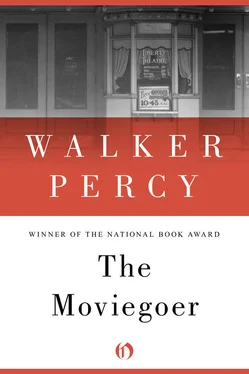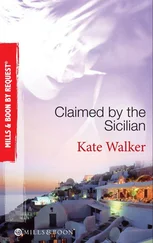“I did not like the war.”
“Because afterwards everyone said: what a frightful experience she went through and doesn’t she do remarkably well. So then I did very well indeed. I would have made a good soldier.”
“Why do you want to be a soldier?”
“How simple it would be to fight. What a pleasant thing it must be to be among people who are afraid for the first time when you yourself for the first time in your life have a proper flesh-and-blood enemy to be afraid of. What a lark! Isn’t that the secret of heroes?”
“I couldn’t say. I wasn’t a hero.”
Kate muses. “Can you remember the happiest moment of your life?”
“No. Unless it was getting out of the army.”
“I can. It was in the fall of nineteen fifty-five. I was nineteen years old and I was going to marry Lyell and Lyell was a fine fellow. We were driving from Pass Christian to Natchez to see Lyell’s family and the next day we were going up to Oxford to see a game. So we went to Natchez and the next day drove to Oxford and saw the game and went to the dance. Of course Lyell had to drive home after the dance. We got almost to Port Gibson and it was after dawn but there was a ground fog. The Trace was still dark in low spots. Lyell passed a car in one of the dips. It was a coupe with the word Spry painted on the door.” Kate tells this in her wan analytic voice and with something of a relish for the oddness of it. “Spry was the last thing I saw. Lyell ran head on into a truckful of cotton-pickers. I must have been slumped down so low that I rolled up into a ball. When I woke up I was lying on the front porch of a shack. I wasn’t even scratched. I heard somebody say that the white man had been killed. I could only think of one thing: I didn’t want to be taken to Lyell’s family in Natchez. Two policemen offered to drive me to a hospital. But I felt all right — somebody had given me a shot. I went over and looked at Lyell and everybody thought I was an onlooker. He had gravel driven into his cheek. There were twenty or thirty cars stopped on the road and then a bus came along. I got on the bus and went into Natchez. There was some blood on my blouse, so when I got to a hotel, I sent it out to be cleaned, took a bath and ordered a big breakfast, ate every crumb and read the Sunday paper. (I can still remember what good coffee it was.) When the blouse came back, I put it on, walked over to the station and caught the Illinois Central for New Orleans. I slept like a log and got off at Carrollton Avenue early in the evening and walked home.”
“When was the happiest moment?”
“It was on the bus. I just stood there until the door opened, then I got on and we went sailing along from bright sunshine down through deep clefts as cool and dark as a springhouse.”
Kate frowns and drums her fingers on the wicker. A diesel horn blows on the river. Overhead a motor labors. Mercer thinks he has to bear down on the waxer — I have noticed that Negroes do not have an affection for motors. “Pardon,” says Kate, rising abruptly and leaving. The little Yankee word serves her well: she leaves in disguise. A water pipe sings and stops with a knock. When Kate returns, she cranes around and smacks her arm cowboy style. The light glimmers in the courtyard and the empty house above us roars like a seashell.
“Does this mean you’re not going to marry Walter?”
“Probably not,” says Kate, yawning at a great rate.
“Are you going to see him tonight?”
“No.”
“Why don’t you come with me?”
“No,” she says, smacking her arm. “I’ll stay here.”
7
SHE COMES UP SO quietly that I think at first it is the Negro boy who wheels the cans of shells into the street and from time to time spreads the whole oysters into the shaved ice. The oyster bar is between the restaurant and the kitchen, a kind of areaway through which waitresses pass. A yellow bulb hangs from the rafters but the service door is open and the areaway is filled with the darkness of the evening.
Kate drums her fingers on the zinc bar and gazes abstractedly as the Negro sweeps oyster grime along the tile floor. The opener begins to set oysters before her.
“I can’t go to Lejiers and I can’t marry Walter.”
I drink beer and watch her.
“I didn’t tell you the truth. It’s bad.”
“This very moment?”
“Yes.”
“Do you want to stay here or go outside?”
“Tell me,” she says, abstracted. A stranger, seeing her, would notice nothing wrong.
“Do you want me to call Merle?”
“No. The other.”
The “other” is a way we found of getting through it before. It has to do with her becoming something of a small boy and my not paying much attention to her. She eats a brown cock oyster, as cold and briny as the sea. She is not so bad. I have seen her worse.
“We’ll go over to St Charles and watch the parade. Then there’s a movie I want to see.”
She nods and presently begins to notice the waitresses, watching with her lips parted and drying, like a boy who has come into a place with his father or brother and so is given leave to see without being seen.
We are in time for the downtown swing of Neptune. The crowd has already moved from the lake side to the river side of St Charles. It is quite dark now. The streetlights make golden spaces inside the wet leaves of the live oaks. A south wind carries the smell of coffee from the Tchoupitoulas docks. Mounted police shoulder the crowd over the curb. To the dark neutral ground come Negroes from Louisiana Avenue and Claiborne; some Negro men carry children astride their necks to see over the crowd.
Here is the public service truck with its tower, measuring the clearance under the oak limbs and cutting some wet drooping branches. We wait to see the flambeaux bearers and now here they come, a vanguard of half a dozen extraordinary Negroes dressed in dirty Ku Klux Klan robes, each bearing aloft a brace of pink and white flares. The flambeaux create a sensation. The bearers stride swiftly along the very edge of the crowd, showering sparks on everyone. They look angrily at each other to keep abreast, their fierce black faces peeping sidewise from their soiled hoods. Kate laughs at them. The Negro onlookers find them funny, but their bold manner, their contemptuous treatment of the crowd, excites them too. “Ah now!” they cry. “Look at him! Ain’t he something though!”
The floats rumble along under the leaves. Some fathers have brought ladders with orange crates, big enough for three children, nailed to the top. These lucky ones gaze openmouthed at the maskers who pass them at eye level and almost within reach. The maskers look like crusaders with their nosepieces and their black eye sockets. Yet these specters are strangely good-natured, leaning forward and dropping whole bunches of necklaces and bracelets or sailing them over to the colored folk in the neutral ground. High school bands from North Louisiana and Texas follow the floats. Negro boys run along behind the crowd to keep up with the parade and catch the trinkets that sail too high.
The krewe captain and a duke come toward us on horseback.
I ask Kate whether she wants to see Walter.
“No.”
“We’d better go then.”
Panic in the Streets with Richard Widmark is playing on Tchoupitoulas Street. The movie was filmed in New Orleans. Richard Widmark is a public health inspector who learns that a culture of cholera bacilli has gotten loose in the city. Kate watches, lips parted and dry. She understands my moviegoing but in her own antic fashion. There is a scene which shows the very neighborhood of the theater. Kate gives me a look — it is understood that we do not speak during the movie.
Afterwards in the street, she looks around the neighborhood. “Yes, it is certified now.”
Читать дальше












